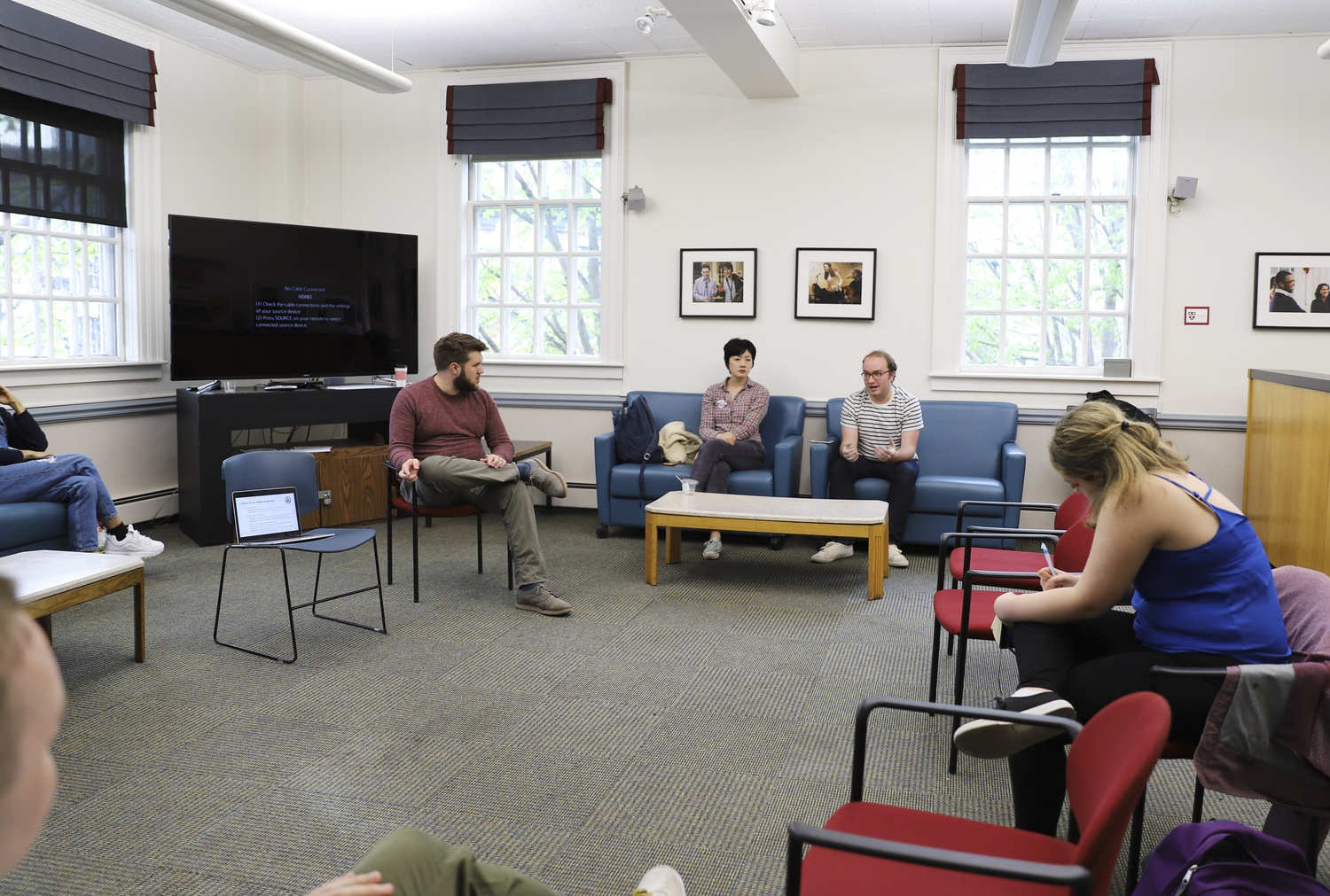
News
Summers Will Not Finish Semester of Teaching as Harvard Investigates Epstein Ties

News
Harvard College Students Report Favoring Divestment from Israel in HUA Survey

News
‘He Should Resign’: Harvard Undergrads Take Hard Line Against Summers Over Epstein Scandal

News
Harvard To Launch New Investigation Into Epstein’s Ties to Summers, Other University Affiliates

News
Harvard Students To Vote on Divestment From Israel in Inaugural HUA Election Survey
Graduate Student Union and Council Fail to Draw Crowd at Joint Town Hall

Harvard’s graduate student union and Graduate Student Council co-hosted their first-ever joint town hall meeting Thursday, drawing only one attendee beyond the organizers.
The purpose of the meeting was to update graduate students on the status of the union bargaining committee's efforts and how students can get involved with ongoing union organizing.
Harvard Graduate Students Union-United Automobile Workers bargaining committee member and Physics graduate student Cole M. Meisenhelder shared the status of the union’s collective bargaining process with Harvard, highlighting issues like grievance procedures, compensation, and healthcare.
The union’s economic proposals would bring a “significant raise” to graduate student stipends in the contract’s inaugural year, and additional six percent raises each subsequent year, according to Meisenhelder.
The University, on the other hand, has proposed a three percent raise in the contract’s first year and two percent raises in the subsequent years of the contract, according to Meisenhelder.
“We viewed it as trying to bring us to ourselves in line with some of our other unionized competitor schools,” Meisenhelder said.
University spokesperson Jonathan L. Swain confirmed in an emailed statement that the union’s proposal includes a double-digit raise in the first year.
Meisenhelder also said that Harvard rejected bargaining on the union’s healthcare proposal but that the union plans to persist in its efforts.
Swain wrote that while Harvard disagreed with “structural changes” in the union health plan, it proposed new funds for spouses’ and dependents’ premium costs, as well as assistance with dental expenses.
Thursday evening’s town hall went unattended for 22 minutes. Three union representatives and one volunteer were present as well as three GSC executive board members. Five minutes into the empty town hall, GSC’s incoming president Zach M. Hayworth proposed filming the presentation and putting it online.
“They need the information whether or not they want it,” GSC representative Michael Ortiz said.
Finally, the first and sole attendee arrived nearly halfway through the event — an undergraduate sophomore involved with Harvard Student Labor Action Movement. The organizers stayed for a full 30 minutes to give her the presentation in person.
Meisenhelder said while he thinks the event is important, he does not consider the sparse attendance “a loss.”
“I think the timing is difficult just because it's the end of the semester and we're also building up our organizing towards the march on May 1,” said Meisenhelder, referencing a planned march for the one-year anniversary of the union’s official recognition next week.
This meeting comes a week after the one-year anniversary of HGSU’s unionization vote. On the anniversary, HGSU organized a work-in celebration, which drew attendance from roughly 450 Harvard affiliates, according to union bargaining committee member Rachel J. Sandalow-Ash ’15.
GSC recently voted in a pro-union executive board and voted last month to support the union’s sexual harassment and non-discrimination grievance proposal.
Organizers said the joint town hall was meant to highlight the union and the GSC’s shared population and goals. HGSU and the GSC jointly represent 2,000 students at any given time — roughly 40 to 50 percent of the Graduate School of Arts and Sciences population, according to Hayworth.
“These are two organizations that have overlapping populations, goals, and procedures for achieving those goals,” Meisenhelder said.
The GSC and graduate students union plan to elect a liaison in charge of bolstering conversation between the two organizations sometime soon, according to Hayworth.
“The liaison position would be someone who is participating in planning meetings for the Union, and at a bare minimum, coming to all the GSC open meetings and sharing updates with the representatives,” Hayworth wrote in an emailed statement. “But ideally, they would also come to GSC executive board meetings, dean’s meetings, and participate as a non-voting member.”
—Staff writer Luke A. Williams can be reached at luke.williams@thecrimson.com. Follow him on Twitter @LukeAWilliams22.
—Staff writer Ruoqi Zhang can be reached at ruoqi.zhang@thecrimson.com. Follow him on Twitter @RuoqiZhang3.
Want to keep up with breaking news? Subscribe to our email newsletter.
